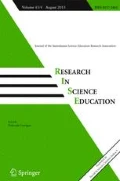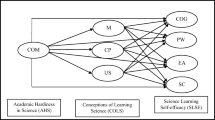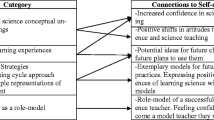Abstract
The preservice training of primary teachers is an opportunity to provide positive experiences which may ameliorate students' anxiety about science and science teaching, and enhance their beliefs that they may become effective science teachers. The previous and current science related experiences, and beliefs, of an intake of primary teachers participating in an introductory science content subject, were explored. Matter and energy concepts were major content components of the subject. Data were collected from pre- and post-test administrations of psychometric tests designed to measure students' science teaching self-efficacy, science related attitudes, interest in science teaching, and preferred learning environment. A randomly selected sample of students was interviewed at the commencement and finish of the subject. One third of the sample was assigned to a study group in which a constructivist approach to laboratorys sessions was adopted. The remainder of the sample experienced a more traditional transmissive format in laboratory sessions. Analysis of the quantitative data revealed no group differences in self-efficacy. Interesting contrasts between students evident in the data from the interviews facilitated the articulation of tentative assertions about the causative factors that may influence the development of students' sense of self-efficacy and possible science related anxiety.
Similar content being viewed by others
References
Ashton, P.T., & Webb, R.B. (1986).Making a difference: Teachers' sense of efficacy and student achievement, New York: Longmans.
Bandura, A. (1977). Self-efficacy: Toward a unifying theory of behavioural change.Psychological Review, 84, 191–215.
Blumenfeld-Jones, D. S. (1994, April).A cultural models approach to teacher thinking: A focus on learning and pleasure. Paper presented at the Annual Meeting of the American Educational Research Association, New Orleans, LA.
Clark, C.M., & Peterson, P.L. (1986). Teachers' thought processes, In M. C. Wittrock (Ed.),Handbook of Research on Teaching (3rd ed). New York: Macmillan.
Dembo, M.H., & Gibson, S. (1985). Teachers' sense of efficacy: An important factor in school improvement.The Elementary School Journal, 86(2), 173–184.
Department of Employment Education and Training. (1989).The Discipline Review of Mathematics and Science. Canberra: Australian Government Publishing Service.
Enochs, L.G., & Riggs, I.M. (1990). Further development of an elementary science teaching efficacy belief instrument: a preservice elementary scale.School Science & Mathematics, 90(8), 694–706.
Franz, J.R. & Enochs, L.G. (1982). Elementary school science: State certification requirements in science and their implications.Science Education, 66, 287–292.
Fraser, B. (1981).TOSRA: Test of Science-Related Attitudes. Hawthorn, Victoria: Australian Council for Educational Research.
Fraser, B.J., Tobin, K., & Lacy, T. (1988). Study of exemplary primary science teachers.Research in Science and Technology Education, 6, 25–38.
Germann, P.J. (1988). Development of the attitude toward science in school assessment and its use to investigate the relationship between science achievement and attitude toward science in school.Journal of Research in Science Teaching, 25(8), 689–703.
Ginns, I.S., & Foster, W.J. (1983). Preservice elementary teacher attitudes to science and science teaching.Science Education, 67(2), 277–282.
Ginns, I.S., & Watters, J.J. (1994, April).A longitudinal study of preservice teachers' personal and science teaching efficacy. Paper presented at the Annual Meeting of the American Educational Research Association, New Orleans, LA.
Greenwood, G.E., Olejnik, S.F., & Parkay, F.W. (1990). Relationships between four teacher efficacy belief patterns and selected teacher characteristics.Journal of Research and Development in Education, 23, 102–106.
Haladyna, T., Olsen, R., & Shaughnessy, J. (1983). Correlates of attitude towards science.Journal of Research in Science Teaching, 20(4), 311–324.
Koballa, J.R., & Crawley, F.E. (1985). The influence of attitude on science teaching and learning.School Science and Mathematics, 85(3), 222–232.
Lucas, K.B., & Dooley, J.H. (1982). Student teacher attitudes toward science and science teaching.Journal of Research in Science Teaching, 19(9), 805–809.
Lucas, K.B., Ginns, I.S., Tulip, D.F., & Watters, J.J. (1993, April).Science teacher efficacy, locus of control and self concept of Australian preservice elementary school teachers. Paper presented at the Annual Meeting of the National Association for Research in Science Teaching, Atlanta, GA.
Markle, G.C. (1978). Assessing the validity and reliability of the subject preference inventory with preservice elementary teachers.Journal of Research in Science Teaching, 15, 519–522.
Michael, W.B., & Smith, R.A. (1976). The development and preliminary validation of three forms of self-concept measure emphasizing school-related activities.Educational and Psychological Measurement, 38, 527–535.
Norušis, M.J. (1993).SPSS for Windows: Base system user's guide, Release 6.0. Chicago: SPSS Inc.
Pintrich, P.R., Marx, R.W., & Boyle, R.A. (1993). Beyond cold conceptual change: The role of motivational beliefs and classroom contextual factors in the process of conceptual change.Review of Educational Research, 63(2), 167–199.
Shulman, L. (1987). Knowledge of teaching: Foundations of the new reform.Harvard Educational Review, 57(1), 1–21.
Schibeci, R.A. (1984). Attitudes to science: An update.Studies in Science Education, 11, 26–59.
Taylor, P.C.S., Fraser, B.J., & White, L.R. (1994, April).CLES: An instrument for monitoring the development of constructivist learning environments. Paper presented at the Annual Meeting of the American Educational Research Association, New Orleans, LA.
Tilgner, P.J. (1990). Avolding science in the elementary school.Science Education, 74(4), 421–431.
Watters, J.J., & Ginns, I.S. (1994, July).Enhancing preservice teacher education students sense of science teaching self efficacy. Paper presented at the annual meeting of the Australian Teacher Education Association, Brisbane.
Yager, R. (1991). The constructivist learning model.The Science Teacher, 58(6), 52–57.
Author information
Authors and Affiliations
Additional information
Specialisations: science teacher education, conceptual change, scientific reasoning.
Specialisations: science teacher education, conceptual change, scientific reasoning.
Rights and permissions
About this article
Cite this article
Watters, J., Ginns, I. Self-efficacy and science anxiety among preservice primary teachers: Origins and remedies. Research in Science Education 24, 348–357 (1994). https://doi.org/10.1007/BF02356362
Issue Date:
DOI: https://doi.org/10.1007/BF02356362




